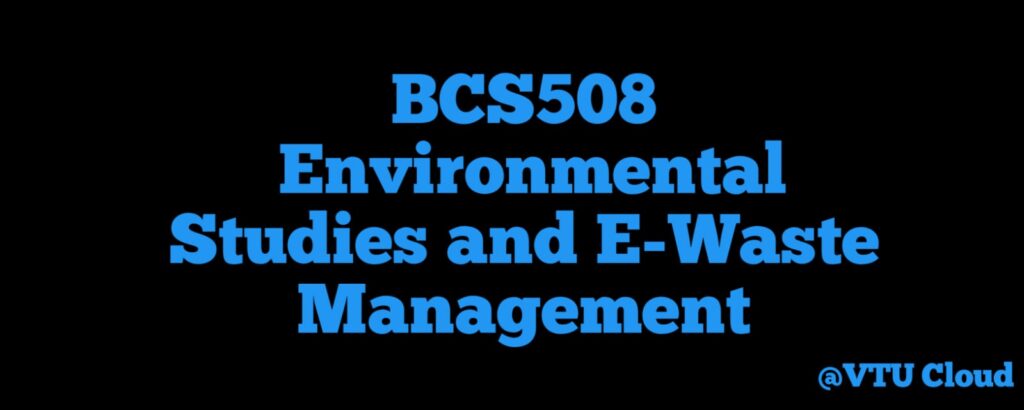BCS508 Environmental Studies and E-Waste Management

Course Learning Objectives
● Identify the major challenges of environmental issues
● Develop skills, critical thinking and demonstrate socio-economic skills for Environmental protection
● Analyze the impact of issues w. r. t. waste management
SYLLABUS COPY
MODULE - 1
Ecosystem and Sustainability
Ecosystem : Structure of Ecosystem, Types: Forest, Desert, Wetlands, Riverine, Oceanic ecosystems. Sustainability : 17SDG targets and possible actions.
Self-Study Component (SSC) : Components of the environment.
MODULE - 2
Natural resources and Energy
Natural Resources : Water resources – Availability & Quality aspects, Water borne diseases & water induced diseases, Fluoride problem in drinking water.
Energy : Different types of energy, Conventional sources & Non -Conventional sources of Energy, Solar energy, Wind Energy, Hydrogen as an alternative energy
Self-Study Component (SSC) : Alternative Energy sources
MODULE - 3
Environmental Pollution
Environmental Pollution : Water Pollution, Noise pollution, Air pollution (Sources, Impacts, Preventive measures and Public Health Aspects.
Self-Study Component (SSC) : Case studies of air pollution episodes
MODULE - 4
Waste management
Waste management : Solid Waste Management , types and sources, functional elements of SWM, Biomedical Waste Management – Sources, Characteristics
Environmental Legislation : Solid Waste Management Rules, 2016, Biomedical Waste Management Rules, 2016. Self-Study Component (SSC) : Case studies on waste management options
MODULE - 5
E – Waste Management
E- waste ; composition and generation. Global context in e- waste; E-waste pollutants, E waste hazardous properties, Effects of pollutant (E- waste) on human health and surrounding environment, domestic e-waste disposal, Basic principles of E waste management, Component of E waste management. E-waste (Management and Handling) Rules, 2011; and E-Waste (Management) Rules, 2022 – Salient Features and its implications.
Self-Study Component (SSC) : E-Waste (Management) Amendment Rules, 2023, 2024
Course outcome
1. Comprehend the principles of ecology and environmental issues pertaining to air, land, and water on a global scale.
2. Acquire observation skills for solving problems related to the environment.
3. Conduct survey to describe the realities of waste management system.
Suggested Learning Resources
Textbooks
1. S M Prakash , “Environmental Studies” 3rd Edition, Elite Publishing House, Mangalore, 2018.
2. Hester R.E., and Harrison R.M, Electronic Waste Management. Science, 2009.
Reference Books
1. Earch Barucha, “Environmental Studies for UG students”, 2004.
2. Benny Joseph (2005), “Environmental Studies” , Tata McGraw – Hill Publishing Company Limited.
3. R. Rajagopalan, “Environmental Studies- From Crisis to Cure” , 2nd Edition, Oxford university press, New Delhi, 2013.
4. Johri R., E-waste: implications, regulations, and management in India and current global best practices, TERI Press, New Delhi.
5. Raman Sivakumar, “Principles of Environmental Science and Engineering”, 2nd edition, Cengage learning Singapur, 2005.
6. G. Tyler Miller Jr., “Environmental Science – working with the Earth”, Eleventh Edition, Thomson Brooks /Cole, 2006
7. Dr. Pratiba Singh, Dr.Anoop Singh and Dr. Piyush Malaviya, “Text Book of Environmental and Ecology”, Acme Learning Pvt. Ltd. New Delhi. 8. P. Meenakshi, “Elements of Environmental Science and Engineering”, Prentice Hall of India Private Limited, New Delhi, 2006